Filter by
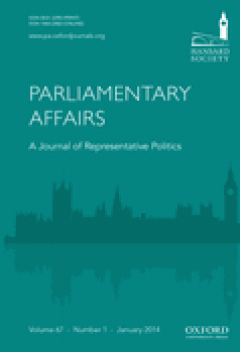
Proportional Prayers: Time for Reflection in the Scottish Parliament
Time for Reflection (TFR) was designed at the inception of the Scottish Parliament in 1999, as an alternative to Westminster Anglican prayers, to provide a weekly opportunity for representatives of religions and belief systems to address the Parliament. Appearances are designed to reflect the diversity of belief in proportion to relative support in the country as evident in the 2001 census. Chr…
- Edition
- Volume 66 Issue 4 October 2013 p. 816-834
- ISBN/ISSN
- 0031-2290
- Collation
- -
- Series Title
- Parliamentary Affairs
- Call Number
- -

Linking Pre-Parliamentary Political Experience and the Career Trajectories of…
This article uses empirical data to establish and analyse the links between pre-parliamentary political experience and career trajectory once elected to the House of Commons. It suggests a move away from the existing occupation focused frameworks towards a broader �political experience� approach which distinguishes between traditional and non-traditional routes into Parliament. The framework is…
- Edition
- Volume 66 Issue 4 October 2013 p. 685-707
- ISBN/ISSN
- 0031-2290
- Collation
- -
- Series Title
- Parliamentary Affairs
- Call Number
- -

Brothers all? The Operation of the Electoral College in the 2010 Labour Leade…
This article analyses the wealth of data released by the Labour Party on its 2010 leadership election. We uncover the way in which the list of candidates was expanded via the initial nomination process in the parliamentary Labour Party and highlight the artificiality of some candidacies. We find little evidence in the voting data to support the belief that the Miliband brothers represented tw…
- Edition
- Volume 66 Issue 4 October 2013 p. 708-731
- ISBN/ISSN
- 0031-2290
- Collation
- -
- Series Title
- Parliamentary Affairs
- Call Number
- -

Recall of MPs in the UK: ‘If I Were You I Wouldn't Start from Here’
The publication of a White Paper, Recall of MPs, and a draft Bill for pre-legislative scrutiny, by the UK Government in December 2011 was greeted with almost universal antipathy. In bringing forward the draft Bill Cabinet Office ministers declared their intention to �trigger a debate on what would be the best model for a recall mechanism� and they expressed a willingness �to consider alternativ…
- Edition
- Volume 66 Issue 4 October 2013 p. 732-751
- ISBN/ISSN
- 0031-2290
- Collation
- -
- Series Title
- Parliamentary Affairs
- Call Number
- -

Making Democracy Work by Early Formal Engagement? A Comparative Exploration o…
Comparative trends in political participation in the West draw a pessimistic picture: younger generations tend to avoid formal politics, opting instead for radical forms of political engagement or opting out altogether from the political process. This trend poses an obvious threat to the core democratic idea of popular control of government. One remedy for this problem, proposed in recent years…
- Edition
- Volume 66 Issue 4 October 2013 p. 752-771
- ISBN/ISSN
- 0031-2290
- Collation
- -
- Series Title
- Parliamentary Affairs
- Call Number
- -

Assessing the Impact of Parliamentary Oversight Committees: The Select Commit…
The departmental select committees of the British House of Commons deal with executive oversight, but not with legislation. This has two important knock-on effects. First, although these committees are permanent, expert, and largely well regarded in Britain, they are often overlooked by omparative scholars. Second, and connectedly, their impact on policy is very difficult to assess. Even in the…
- Edition
- Volume 66 Issue 4 October 2013 p. 772-797
- ISBN/ISSN
- 0031-2290
- Collation
- -
- Series Title
- Parliamentary Affairs
- Call Number
- -

Petitions Systems: Contributing to Representative Democracy?
Focusing on case studies of five different petitions systems, but also drawing on the Coalition government's new e-petitions system, this article identifies a number of characteristics of petitions systems. It argues that as a tool for participation they have the potential to act as a significant input to representative forms of democracy by providing a mechanism to enable the public to express…
- Edition
- Volume 66 Issue 4 October 2013 p. 798-815
- ISBN/ISSN
- 0031-2290
- Collation
- -
- Series Title
- Parliamentary Affairs
- Call Number
- -
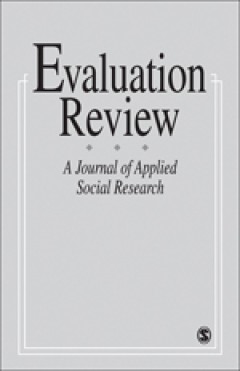
Evaluation Review, Volume 36 Nomor 6 December 2012
- Edition
- -
- ISBN/ISSN
- 0193-841X
- Collation
- -
- Series Title
- -
- Call Number
- -
- Edition
- -
- ISBN/ISSN
- 0193-841X
- Collation
- -
- Series Title
- -
- Call Number
- -

Evaluation Review, Volume 37, Nomor 1 February 2013
- Edition
- -
- ISBN/ISSN
- 0193-841X
- Collation
- -
- Series Title
- -
- Call Number
- -
- Edition
- -
- ISBN/ISSN
- 0193-841X
- Collation
- -
- Series Title
- -
- Call Number
- -

Parliamentary Affairs, Volume 66, Nomor 4 October 2013
- Edition
- -
- ISBN/ISSN
- 0031-2290
- Collation
- -
- Series Title
- -
- Call Number
- -
- Edition
- -
- ISBN/ISSN
- 0031-2290
- Collation
- -
- Series Title
- -
- Call Number
- -
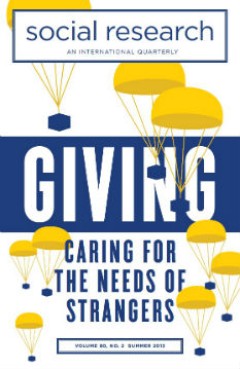
Social Research, Volume 80, Nomor 2, Summer 2013
- Edition
- -
- ISBN/ISSN
- 0037-783X
- Collation
- -
- Series Title
- -
- Call Number
- -
- Edition
- -
- ISBN/ISSN
- 0037-783X
- Collation
- -
- Series Title
- -
- Call Number
- -

Pembangunan untuk Semua: mengelola pembangunan regional ala SBY
Buku ini membahas mengenai uapay Presiden SBY dalam mengelola kebijakan pembangunan nasional di era yang sedang berubah (policy-making process in the changing context). Buku ini mengurai persoalan mendasar dalam pembangunan daerah, agenda kebijakan, danlangkah demi langkah yang telah dilakukan oleh Presiden dalam menyatukan semua potensi anak bangsa guna menggapai visi nasional kita, yait…
- Edition
- -
- ISBN/ISSN
- 978-602-99998-1-5
- Collation
- 425p.; 21 cm
- Series Title
- -
- Call Number
- 338.959 8 WAN p

Masalah Negara Kepulauan di Era Globalisasi
Buku ini mendeskripsikan data dan kajian tentang masalah-masalah yang dihadapi oleh Indonesia sebagai Negara kepulauan. Ada enam kajian yang dipaparkan; pertama tentang budaya maritime, geopolitik dan tantangan keamanan Indonesia; kedua , tentang pengelolaan wilayah pesisir dan laut oleh pemerintah pusat dan pemerintah daerah; ketiga, tentang studi perbandingan program pemberdayaan masyar…
- Edition
- 1st print
- ISBN/ISSN
- 978-602-8722-26-1
- Collation
- xi, 205p.; 24 cm
- Series Title
- -
- Call Number
- 352 NAI m

Wilayah Pesisir & Pulau-Pulau Keecil di Indonesia
Buku ini menelaah berbagai aspek pengelolaan wilayah pesisir dan pulau-pulau kecil di Indonesia. Ada lima persoalan yang disorot: Pertama, tentang hak pengusahaan perairan pesisir yang boleh diberikan kepada masyarakat lokal, nelayan tradisional, dan pelaku usaha; Kedua, nilai strategis coral triangle initiative bagi masyarakat pesisir; Ketiga, peran lembaga swadaya masyarakat inter- n…
- Edition
- 1st print
- ISBN/ISSN
- 978-979-9052-81-0
- Collation
- xix, 188p.; 24 cm
- Series Title
- -
- Call Number
- 352 NAI w
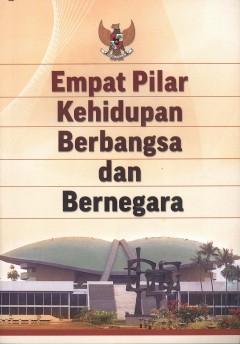
Empat Pilar Kehidupan Berbangsa dan Bernegara
Negara Indonesia adalah Negara yang besar. Sejak awal berdirinya Negara Kesatuan Republik Indonesia, para pendiri Negara menyadari bahwa Bangsa Indonesia merupakan bangsa yang majemuk karena terdiri atas berbagai suku bangsa, adat istiadat, budaya, bahasa daerah serta agama yang berbeda-beda. Dengan keanekaragaman tersebut, mengharuskan setiap langkah dan kebijakan Negara dalam kehidupan…
- Edition
- -
- ISBN/ISSN
- 978-602-9053-26-5
- Collation
- xxii, 214p.; 20 cm
- Series Title
- -
- Call Number
- 320.959 8 IND e
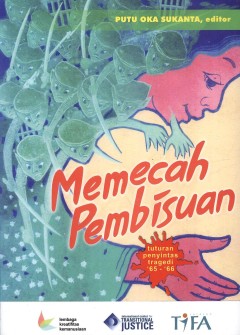
Memecah Pembisuan: tuturan penyintas tragedi 65-66
Peristiwa G 30 S telah menjadikan banyak keluarga-keluarga yang menjadi susah hidupnya karena masalah ketidaktahuannya sebagai masyarakat tentang apa yang sebenarnya terjadi pada tahun 1965 itu. Buku ini merupakan kumpulan artikel yang mendokumentasikan tentang kehidupan yang pernah dan sekarang dijalani para korban yang dituturkan melalui berbagai cerita yang dituliskan. Sebagai suatu p…
- Edition
- -
- ISBN/ISSN
- 978-602-99858-0-1
- Collation
- xviii, 315p.; 21 cm
- Series Title
- -
- Call Number
- 959.8 SUK m

Evaluasi Otonomi Daerah dalam Perspektif Peningkatan Kesejahteraan dan Perlua…
Kajian yang dilakukan oleh Sekjen DPD RI ini merupakan dukungan keahlian terhadap kebijakan lembaga dalam mengevaluasi pelaksanaan otonomi daerah dengan fokus penelitian pada Provinsi Nusa Tenggara Barat dan Kalimantan Tengah. Landasan evaluasi dilakukan dengan pendekatan kapabilitas, dimana kesejahteraan tidak diukur semata melalui peningkatan pendapatan ekonomi masyarakat, tetapi dik…
- Edition
- -
- ISBN/ISSN
- -
- Collation
- vii, 89p.; 21 cm
- Series Title
- -
- Call Number
- 352 IND e
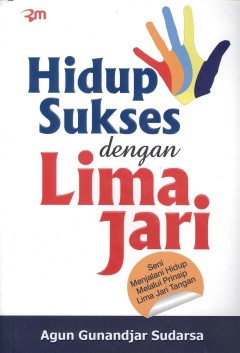
Hidup Sukses dengan Lima Jari: seni menjalani hidup melalui prinsip lima jari…
Buku ini menceritakan perjuangan hidup sang pengarangnya Agun Gunandjar Sudarsa. Dari bukan siapa-siapa menjadi seorang yang dikenal public karena berbagai gagasan-gagasan selama menjadi anggota legislative selama empat periode. Buku biography yang kaya akan motivasi hidup ini terlihat jelas bagaimana sebenarnya kehidupan ini disikapi oleh setiap orang dengan pandangannya masing-masin…
- Edition
- -
- ISBN/ISSN
- 978-602-7936-12-6
- Collation
- xiii, 156p.; 21 cm
- Series Title
- -
- Call Number
- 920 SUD h

Journal of Democracy, Volume 24 Number 2, April 2013
- Edition
- -
- ISBN/ISSN
- 1045-5736
- Collation
- -
- Series Title
- -
- Call Number
- -
- Edition
- -
- ISBN/ISSN
- 1045-5736
- Collation
- -
- Series Title
- -
- Call Number
- -

Multicultural citizenship education in Indonesia: The case of a Chinese Chris…
This study investigates how multicultural citizenship education is taught in a Chinese Christian school in Jakarta, where multiculturalism is not a natural experience. Schoolyard ethnographic research was deployed to explore the reality of a �double minority� � Chinese Christians � and how the citizenship of this marginal group is constructed and contested in national, school, and familial disc…
- Edition
- -
- ISBN/ISSN
- 0022-4634
- Collation
- -
- Series Title
- -
- Call Number
- -
 Computer Science, Information & General Works
Computer Science, Information & General Works  Philosophy & Psychology
Philosophy & Psychology  Religion
Religion  Social Sciences
Social Sciences  Language
Language  Pure Science
Pure Science  Applied Sciences
Applied Sciences  Art & Recreation
Art & Recreation  Literature
Literature  History & Geography
History & Geography